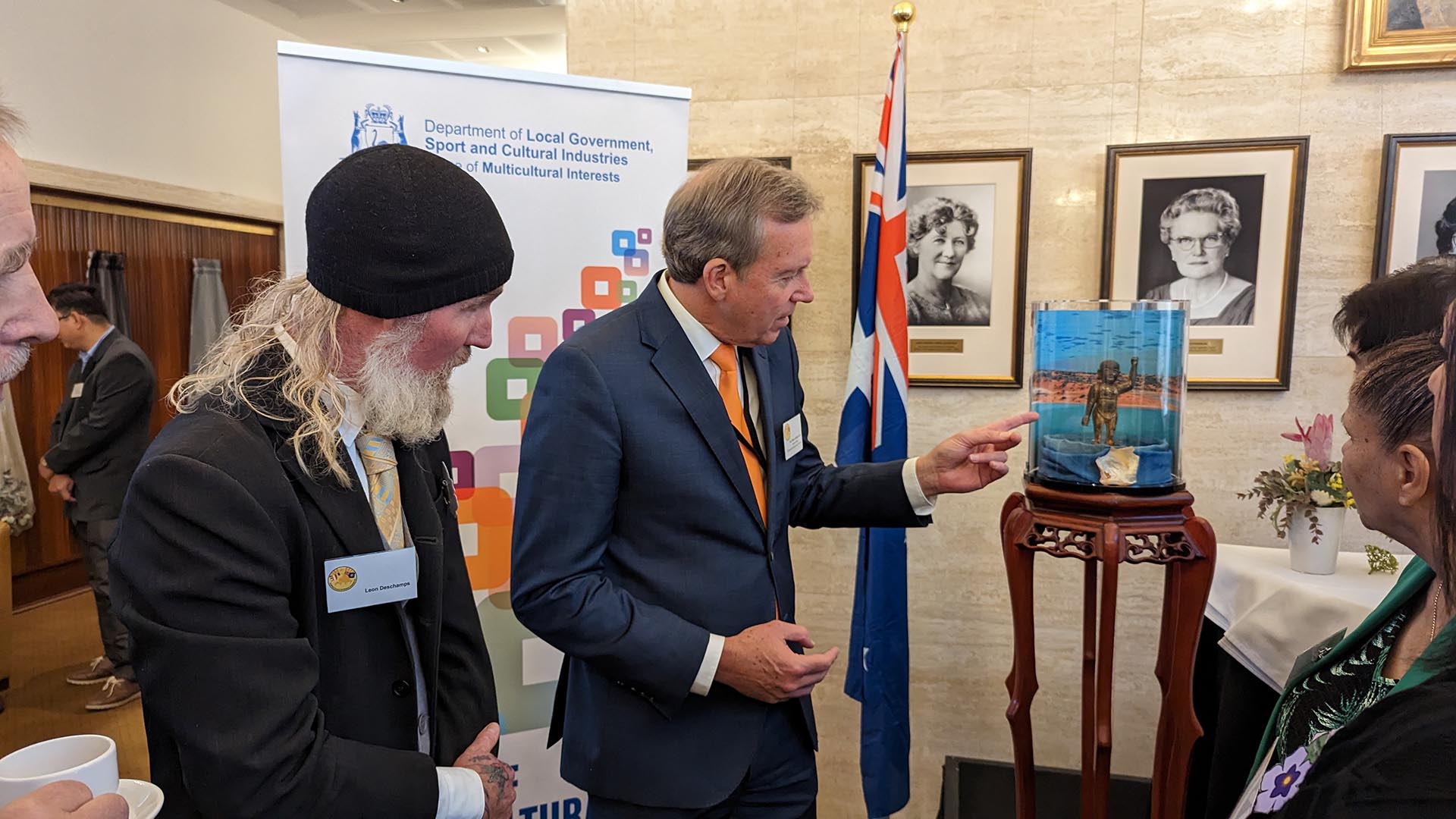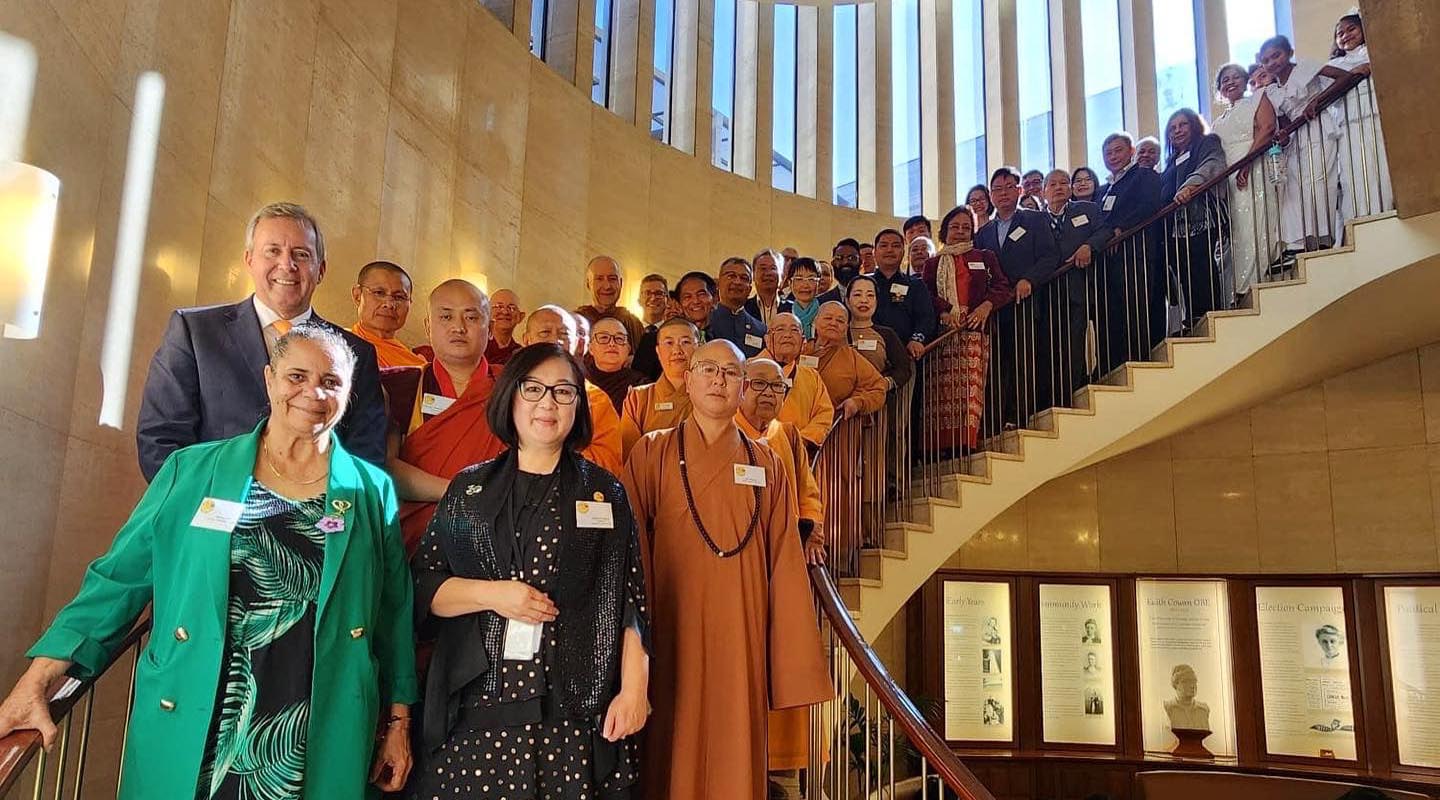Australia Acknowledges
Baby Buddha Honoured at Parliament House
Baby Buddha was invited to the West Australian Parliament House by the Buddhist Council of WA as a guest of honour for the first ever celebration of Vesak Day, the most holy day in the Buddhist calendar. It was noted at this event that the Baby Buddha was a high status object of worship worthy of an Emperor.
“Tread lightly on the lands of my Noongar brothers and sisters and may their ancestors hold you in safe passage.”
Patricia Oakley Vesak Celebration Speech 26th May 2023
(The following is spoken in Malgana language).
Yandani nhurra
Ngatha Pat Oakley, Malgana nyarlu ngangga gantharri Gathaaguduguji,
Malgana barrajala wirriyala maya yaburru wardandu Yamaji ngurra
Ngali wangganyina ngarnija mandarrinu ngugunu wuduru gudu.
(Malgana to English translation)
Greetings everyone,
I am Pat Oakley, Malgana woman, mother, and grandmother from Shark Bay, our land and sea home in Yamatji country in the northwest of Western Australia. We will talk eat drink and laugh with good hearts.
I would also like to acknowledge the Whadjuk Noongar people, who are the traditional custodians on whose land we meet today, and I pay my respects to their Elders past present and emerging. Tread lightly on the lands of my Noongar brothers and sisters and may their ancestors hold you in safe passage.
Shark Bay’s rich Cultural heritage began about 30,000 years ago with Aboriginal people belonging to the Nhanda and Yingarda language groups who inhabited the southern and northern boundaries respectively and the Malgana who inhabited the area within. Since the seventeenth century Dutch traders, French explorers, English entrepreneurs, workers from Asia and the Pacific, and tourists from all over the world have come to Shark Bay including Chinese immigrants who came to Shark Bay in the mid 1800’s to take up a successful presence in the local pearling and sandalwood industries.
Shark Bay is not only a place of immense beauty, with its contrasting colours, glimmering beaches and its unique natural biodiversity and healing qualities but it also has a rich history of multiculturalism leaving many Malgana and local descendants with a fusion of ancestral twine. This ancestral twine has shaped our way of life where our actions have been guided by our cultural values, hard work, love of family, friends and country and respect and good will for others.
The Buddha said, “It is better to travel than to arrive.“
We do not know the story of how the Baby Buddha travelled or arrived on Malgana country. His story was, until now, lost in the sands of time.
He may have first arrived on Malgana country in the hands of an early Chinese or Malay Pearling captain or aboard a Ming treasure fleet sent out by the emperor of China. Equally he may have journeyed along one of the song lines that connect Aboriginal Australia nationwide in a network of trade routes that are older than the Silk Road, passed hand to hand from elder to elder before arriving in Gathaagudu. Its importance as an object of devotion therefore is not limited to its Chinese Nation of origin but perhaps in a way, he has been sacred to all those hands that have bought him on his journey here today.
His arrival bought ancient Asian and early Aboriginal culture together perhaps for the very first-time centuries ago and now he has bought us all here, the children of a multicultural Australia to celebrate his birthday.
There are many histories of Australia that have not been taught, and like the Buddha have been lost to the modern story of Australia. It is time these stories were given their rightful place in our proud history. The Infant Buddha’s arrival predates the construction of the Western Australian Parliament building we stand in today to celebrate his life.
His story tells of an instant that was a pivotal and watershed first contact moment between Aboriginal and Asian cultures that began centuries of coexistence that has built the Australia we know and love today.
When Shayne and Leon found the Buddha, the first person they shared the discovery with was my brother Nick. His guidance helped them to understand that this was a sacred object of devotion and ceremony and as such should be treated with respect.
It was this moment and his wisdom that began half a decade of research into the Buddhas origins culminating in the Buddha being declared a “World Treasure” by Ming Art Historian Lee Young during an examination in the United Kingdom for the television program Antiques Roadshow.
That was quite a moment for them.
The Buddha said, “One moment can change a day, one day can change a life and one life can change the world.“
It is our honour to be invited to join the Buddhist Council of Western Australia today and it is our hope that today, in this moment, that together we can begin a new journey towards peace and harmony and a better understanding of all cultures that today call Australia home.”
As my late brother Nick would say if he was here today, “Nyinda wulawujanu nyinda yajala” “You come a stranger, you leave a friend.”


